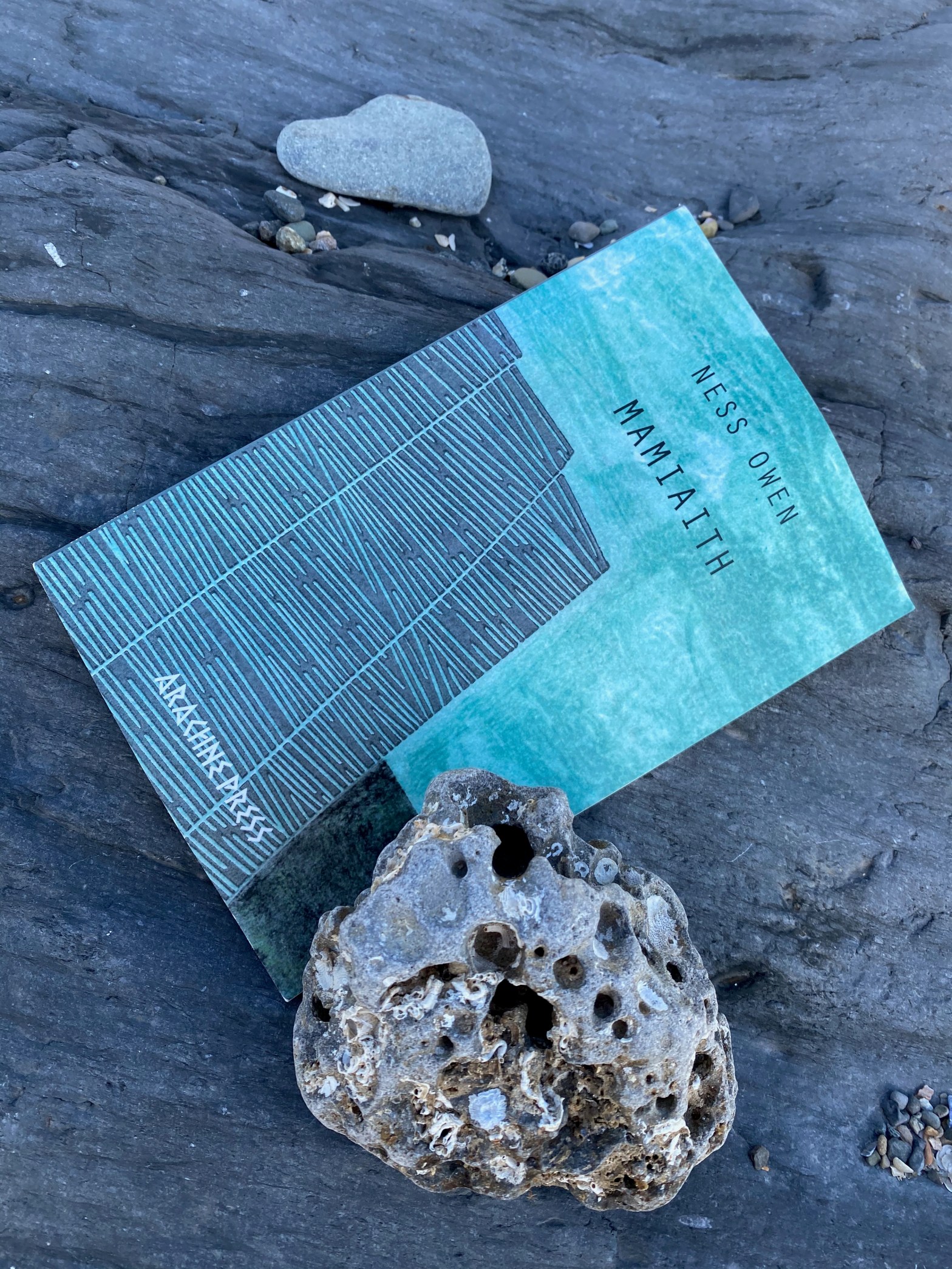‘Begin with fearlessness…’ from the poem How to Begin
Mamiaith by Ness Owen
There is a deep sense of loss in the opening poem to Ness Owen’s Mamiaith (Welsh for Mother Tongue) but it is delicately laid down with a hope for rebirth; a memory planted within the roots so we can look out the window at the end of each day and remember where to blow those goodnight kisses. As we read further and deeper though, we can see that it is not only a hope that has been planted, but an exploration that has begun of the very land where we have our roots, the connection of soil and soul. We start out by opening up to the lessons of the ground beneath us and later, as we near the end, when the birds look down upon us, there is a sense of freedom in their flight.
Simple chores, like mowing the lawn and cooking, become studies in life and how to adapt what we’ve learned and who we’ve learned it from, acknowledging those spirals we move in while trimming off the edges to come closer to the truth. Even the preparation of a simple stew, a rwdan, holds more than just a recipe for making a meal; at the same time as the bones boil on the stove there is a battle brewing between the tradition of silently keeping a lid on everything while we can also hear the stirrings of the next generation’s desire to be bright and brave and bold and empty the contents of a pot of traditions and ask how they came to be and why they have been kept. Interesting to note a poem that follows shortly after this boiling stew is one of a girl, grown into woman, watching her own daughter grow up but again, all is grounded by that soil, never far from those feet, stabilizing the soul as if to say this is how it goes.
The collection cleverly deceives the reader with its light appearance; delicate forms of short poems with few words but that too is its strength, like a language not used enough so that words are forgotten and we must cut to the truth without the fluff and frills. I myself have lived in 4 countries now, two of which I had to learn other languages and eventually found my truth to speaking up was to hold the main words, all else would be understood if the message was clear enough to comprehend.
Every poem is reinforced by the echoes each one carries, repetitions to remind us to ‘write and dance and dance and write’, an invitation to rediscover the former songs that once marched out of tightened throats like the reusing of the words in The Appeal to the Women of the United States of America, a peace petition originally written in 1923 – 24 and how the sharing of these stories and the making of our own new ones is the only way to survive the wave that eats people.
Following on from Dawn Dumont’s quote at the beginning of the poem One Name, Cymru- to be born indigenous is to be born an activist- we realise that the fight is happening here, within the considered calls rising up from these carefully chosen lines, each word perfectly formed into a sense of identity often bashed, often silenced but ever resilient.
I am reminded of the famine walls in Ireland, built during a time of such struggle for the Irish workers, when the British decided that if aid was needed then it was to be earned and so they made starving peasants build boundary walls around farm lands, a task of no importance, in order to give them food in return. The walls still stand, tight rocks beaten into position with blood and tears and a longing to be recognised as equally worthy.
And that is what shines through in this collection; tongues once stolen from mother’s mouths, pulled and pushed into position repeatedly, wanting to break out and be recognised as individual and not just a part of a puzzle someone once decided was too difficult to complete and so tucked away in a box.
Sometimes we don’t always understand the call, the song, the note, the granite, but it is our song as Ness Owen so strikingly tells us and, if we listen carefully to the stories, we will come to realise that ‘the wave is hungry again’ and the time to march is here for ‘silence won’t shape our future.’ So we come and gather and open this collection to learn to listen to the Buzzard because… ‘there is something reassuring in her cry…’
Dal dy dir (stand your ground) Ness says in one poem and this collection is testament to that strength of standing your ground and being heard in a ‘voice that is ours to proclaim a word at a time.’
This collection comes together as a triumph of the soul rising from struggle, a resolute banner call to reclaiming the truth of history and identity of Crymru and I will leave to with a tease of the opening of Female Blackbird Sings…
‘Your song isn’t
as loud as his
born knowing you’ll
have to try harder
still you sing not
just with truth but
wings and tail forcing
out your voice like
you’re drowning in
the chorus till you
find the one note
to stop them still…’
Mamiaith is published by Arachne Press and is available to buy here…


Reblogged this on The Wombwell Rainbow.
LikeLike